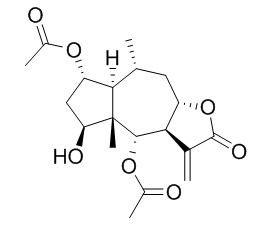Britannin
Britannin has strong cytotoxicity to HepG-2, MCF-7, MDBK and A-549 cells (IC50: 2.2, 5.9, 5.4, and 3.5 microg/mL, respectively). Britannin inhibits growth of MCF-7 and MDA-MB-468 breast cancer cells through the activation of the mitochondrial apoptotic pathway and may potentially serve as an agent for breast cancer therapy.
Inquire / Order:
manager@chemfaces.com
Technical Inquiries:
service@chemfaces.com
Tel:
+86-27-84237783
Fax:
+86-27-84254680
Address:
1 Building, No. 83, CheCheng Rd., Wuhan Economic and Technological Development Zone, Wuhan, Hubei 430056, PRC
Providing storage is as stated on the product vial and the vial is kept tightly sealed, the product can be stored for up to
24 months(2-8C).
Wherever possible, you should prepare and use solutions on the same day. However, if you need to make up stock solutions in advance, we recommend that you store the solution as aliquots in tightly sealed vials at -20C. Generally, these will be useable for up to two weeks. Before use, and prior to opening the vial we recommend that you allow your product to equilibrate to room temperature for at least 1 hour.
Need more advice on solubility, usage and handling? Please email to: service@chemfaces.com
The packaging of the product may have turned upside down during transportation, resulting in the natural compounds adhering to the neck or cap of the vial. take the vial out of its packaging and gently shake to let the compounds fall to the bottom of the vial. for liquid products, centrifuge at 200-500 RPM to gather the liquid at the bottom of the vial. try to avoid loss or contamination during handling.
Horticulture Research2020, 7:111.
Mediators Inflamm.2016, 2016:7216912
Int J Mol Sci.2021, 22(19):10405.
Analytical Letters.2020, doi 10.1008
Analytical Methods2018, 10(27)
Universidade Estadual Paulista2017, 11449
J Cachexia Sarcopenia Muscle.2022, 13(6):3149-3162.
Pharmacia2024, 71:1-9.
Hong Kong Baptist University2023, 048330T.
Sci Rep.2019, 9:19059
Related and Featured Products
Tumour Biol. 2015 Feb;36(2):1191-8.
Britannin, a sesquiterpene lactone, inhibits proliferation and induces apoptosis through the mitochondrial signaling pathway in human breast cancer cells.[Pubmed:
25342596]
Induction of apoptosis in cancer cells can be a promising treatment method in cancer therapy. Naturally derived products had drawn growing attention as agent in cancer therapy. The main target of anticancer drugs may be distinct, but eventually, they lead to identical cell death pathway, which is apoptosis.
METHODS AND RESULTS:
Here, we indicated that Britannin, a sesquiterpene lactone isolated from Asteraceae family, has antiproliferative activity on the MCF-7 and MDA-MB-468 human breast cancer cells. Annexin V/propidium iodide (PI) staining, Hoechst 33258 staining, and caspase-3/9 activity assay confirmed that Britannin is able to induce apoptosis in MCF-7 and MDA-MB-468 cells. The Western blot analysis showed that the expression of Bcl-2 was noticeably decreased in response to Britannin treatment, while the expression of Bax protein was increased, which were positively correlated with elevated expression of p53. Moreover, Britannin also increased reactive oxygen species (ROS) generation which in turn triggered the loss of mitochondrial transmembrane potential (ΔΨm) and the subsequent release of cytochrome c from mitochondria into cytosol.
CONCLUSIONS:
Taken together, these results suggest that Britannin inhibits growth of MCF-7 and MDA-MB-468 breast cancer cells through the activation of the mitochondrial apoptotic pathway and may potentially serve as an agent for breast cancer therapy.
Nat Prod Commun. 2012 Aug;7(8):979-80.
Anti-proliferative activity and apoptotic potential of britannin, a sesquiterpene lactone from Inula aucheriana.[Pubmed:
22978209]
Inula aucheriana n-hexane, CHCl3 and MeOH extracts were evaluated for their anti-proliferative activity against HepG-2, MCF-7, MDBK and A-549 cells.
METHODS AND RESULTS:
The CHCl3 extract exhibited cytotoxic activity to the above cell lines with IC50 values of 13.5, 23.4, 10.5, and 26.9 microg/mL, respectively. The sesquiterpene lactone Britannin was isolated from the above extract. This was further evaluated in the MTT assay to demonstrate strong cytotoxicity to the mentioned cell lines (IC50: 2.2, 5.9, 5.4, and 3.5 microg/mL, respectively), and the apoptotic inducing properties of Britannin were evaluated on human breast adenocarcinoma (MCF-7) cells through the terminal deoxynucleotidyl transferase dUTP nick end labeling (TUNEL) assay.



